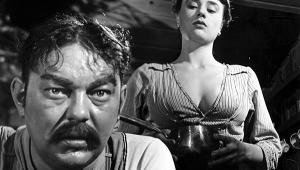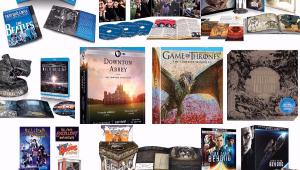Band of Brothers
Most wars can be averted. Many are not. And a few demand to be fought. Had the allies not prevailed militarily in World War II, it's very likely that today we would be goose-stepping to the Stars and Stripes Forever. Or, more likely, there would be no Stars and Stripes Forever. If the hype of the past half decade or so about "The Greatest Generation"—our own fathers and grandfathers—might seem to some to have been overdone, we need to remember that while history suggests that victory in that war was inevitable, in 1942 there were no guarantees.
 This explosive and astonishing miniseries, which first aired on HBO in fall 2001, begins in 1942. Based on Stephen E. Ambrose's bestseller of the same name, Band of Brothers tells the story of Easy Company, the 506th Regiment of the 101st Airborne Division of the U.S. Army. It opens with the recruits at boot camp in Georgia, then follows the unit into battle starting on D-Day, through the Netherlands, at the Battle of the Bulge, and to the final victory in Germany. Along the way, Easy Company endures hardship, terrifying combat, and the loss of many of their number.
This explosive and astonishing miniseries, which first aired on HBO in fall 2001, begins in 1942. Based on Stephen E. Ambrose's bestseller of the same name, Band of Brothers tells the story of Easy Company, the 506th Regiment of the 101st Airborne Division of the U.S. Army. It opens with the recruits at boot camp in Georgia, then follows the unit into battle starting on D-Day, through the Netherlands, at the Battle of the Bulge, and to the final victory in Germany. Along the way, Easy Company endures hardship, terrifying combat, and the loss of many of their number.
For those who survived, the war would likely be the seminal experience of their lives, an event they likely wished to both remember and forget in equal measure. My own father was in the Army in North Africa, Sicily, and Italy in the war, and while as a member of a radar unit he may have been spared the worst of battle, I'll never know for certain. He rarely discussed his experiences with me, short of a few casual, relatively trivial anecdotes. Nor did I ever overhear him talking about it in any greater depth with anyone else. From what I've read, that reluctance was not unusual.
Eight different directors show off their work here, but the series retains a remarkably consistent tone. One of the directors was Tom Hanks, who was also co-executive producer, with Steven Spielberg. Shot in England on a surprisingly small patch of land (as shown in one of the several documentaries on disc 6), the series comes into its own on DVD. I didn't see the original, high-definition broadcast, but compressed into a few days of DVD viewing rather than spread out over several weeks, as first presented, it is an intensely powerful, moving experience. There's plenty of action, but, as in Saving Private Ryan (which it far exceeds in the blood-and-guts department), the emphasis is on the soldiers themselves. The huge cast—too many to list here, and you'd recognize only a few of them—is superb across the board.
The widescreen, anamorphic video presentation, downconverted from the hi-def masters, is often gritty and grainy. That is very likely deliberate and, again, very much in the Saving Private Ryan style. It smooths out somewhat in the last episode, when the war is over and the soldiers are marking time until they're sent home or to the Pacific (where the war still raged). The sound is incredible throughout. The effects, in particular, sound like the real sounds of ground battle—or as close to them as I ever hope to get.
The extras on disc 7 provide extensive background information on the making of the series. But most significant, and moving, is the documentary "We Stand Alone Together: The Men of Easy Company," which tells the story in the surviving soldiers' own words. "Field Guides" on each disc also provide specifics on the company's activities in the specific episode being viewed, and how they relate to the war as a whole. There are also character biographies and CD-ROM web links to appropriate websites.
But the main attraction is the drama itself, not the extras. The television miniseries format provides a platform for stories too extended for a theatrical film, and Band of Brothers may well be the finest miniseries ever made.—TJN
- Log in or register to post comments






























































